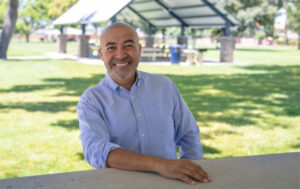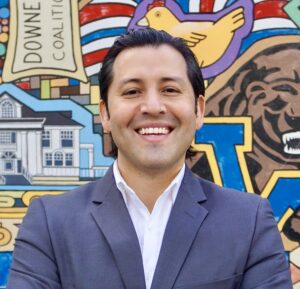Layla Hernandez
Nov. 5, the last day to vote in elections ranging from President to School Board Member, is fast approaching.
Early voting is available, and voters can cast their ballots by mail or in person at voting centers across Los Angeles County. To check registration status, request a vote-by-mail ballot, or find a local voting center, visit lavote.gov.
In Bell Gardens, voters will elect a replacement for former Councilmember Alejandra Cortez in a special election. Cortez resigned last year, and her successor will serve the remaining two years of her term.
The candidates are Planning Commissioner Miguel De La Rosa, business owner Jennifer Rodriguez, Samuel Perez, and Jacob Poliquin.
Rodriguez declined to respond to this questionnaire.
When asked why they are running, De La Rosa said he believes “Bell Gardens deserves strong, visionary leadership” and committed to advocating for affordable housing and supporting seniors, people with disabilities, and single-parent households.
Perez highlighted the need for expanded earthquake emergency plans, saying, “Anticipation always benefits us when facing the unpredictable,” and expressed a desire to boost economic development.
Poliquin aims to “bring the positive change our city needs and deserves” and to represent residents who feel “forgotten or ignored.”
On the issue of rising rents, De La Rosa and Poliquin both support city-backed rental assistance and subsidies for property owners.
Perez emphasized the need for a “balanced perspective” on rent caps, acknowledging its immediate benefits while warning it could “be a deterrent for investment and new housing construction,” and advocating for policies that incentivize housing development.
Perez and De La Rosa have both lived in Bell Gardens for 25 years, while Poliquin has lived in the city for eight years.
All candidates were asked the same questions via a written survey. Responses have been light edited for clarity and are listed in alphabetical order. Candidates self-reported their occupations and residences.
Why are you running?
De La Rosa: I am running for City Council because I believe that Bell Gardens deserves strong, visionary leadership that reflects the needs and desires of our diverse community; I am committed to supporting the needs of special groups such as seniors, persons with disabilities, and single-parent households by advocating for affordable housing.
Perez: I believe it is important for our city/cities to expand earthquake emergency plans in preparation for both the Newport-Inglewood and San Andreas faults. Anticipation always benefits us when facing the unpredictable. We live in a world where division is gaining momentum, but this is something we can all get behind, and it will greatly benefit us.
Bell Gardens is a city with great potential, and I want to contribute to the decision-making that will increase economic development. This nation provides the opportunity not just to think of an idea but to carry it out through elected positions. Running and winning is a way for me to directly address issues and bring solutions to fruition. That is why I am running for City Council.
Poliquin: I’m running to bring the positive change our city needs and deserves. I’m running for the people in my city who feel like they’ve been forgotten or ignored by the elected leaders. I’m running to make sure that the city we all love will continue to thrive. I’m running to help create a better quality of life for everyone in the city.
What is your vision for the future of the city?
De La Rosa: My vision for Bell Gardens is one where every resident has access to affordable housing, quality education, and safe neighborhoods, where small businesses can grow and flourish, and where we preserve our community’s identity while adapting to modern solutions. I believe in a city that prioritizes the well-being of its residents by investing in public infrastructure, enhancing public safety, and expanding green spaces. I want to foster a vibrant, inclusive city where families feel proud to call Bell Gardens home for generations to come.
Perez: For Bell Gardens to have a competitive economy , increase in quality of life, and for the talents that come out of our city to be cultivated for the uplifting and rise of our community. As the old story goes, “Rome was not built in a day,” but by making the right decisions for our city, we can get to a better consistent position for the new generations..
Poliquin: My vision for Bell Gardens is a city that everyone wants to be a part of.
Bell Gardens passed rent stabilization in 2022, establishing a framework to limit excessive rent increases. However, rents are still rising. What are some other solutions that can help prevent renters from being priced out of the city due to rising rents?
De La Rosa: Rent stabilization provides a critical foundation to build upon. To further protect renters, I would advocate for expanding affordable housing programs, first-time homeowner grants, and advocating for the construction of new, low-income housing units. Additionally, tenant education and assistance programs can empower renters to better understand their rights and find resources to remain in their homes. Informing residents of city resources & partnering with nonprofit organizations to offer legal and financial support to at-risk renters is another tool to help prevent displacement.
It’s also important to note that the cost of maintaining property is also rising, it’s critical to create solutions that benefit both renters and landlords to maintain a healthily balanced housing market. We must support local landlords, some approaches to consider include tax incentives or grants for landlords to support property maintenance and improvements — which would ease the burden on landlords and keep housing affordable for tenants.
Perez: Approaching this topic with a truthful approach in order to aim for the best solution by being aware of the State’s housing development mandates, one must approach the immediate need of assistance due to rising rents, as well as the future housing market of the City of Bell Gardens. Rent control has proven to be of immediate help to many residents, and that is a good thing, however it can also be a deterrent for investment and new housing construction, it is vital to approach this with a balanced perspective by also continuing to incentivize housing development that brings improvement in the quality of the city’s infrastructure, as well as stimulating developers to add affordable units in new developments.
Poliquin: I’ve always felt that the city could be doing more for the low income families in our city, perhaps by providing rent assistance initiatives to sponsor families in need. Since the council decided to make decisions for the homeowners in the city with rent stabilization, some sort of incentive to offset the inconvenience to homeowners could also be provided. There’s lots of ideas for a problem that only appears to be getting worse across the country; we need more than simple solutions for bigger problems. I plan to work alongside renters and homeowners to help find a mutual respect and balance for maintaining a fair housing environment for all.
The police budget makes up 42.3% of the city budget. Do you think this is the right amount of spending? What public safety strategies do you think the city could implement that don’t rely on traditional policing?
De La Rosa: Public safety is a top priority for any city, but I believe we should continually assess how our resources are allocated to ensure that they are used efficiently. While our police department plays a critical role in maintaining safety, we also need to explore complementary strategies that address the underlying causes of crime such as: poverty, mental health, and substance abuse. Collaborating with local non-profits and investing in community-based programs like neighborhood watch, youth outreach, mental health crisis intervention teams, and housing services can create a balanced approach to public safety—one that includes prevention, education, and support services.
Perez: When addressing a question of this nature it is important for me to remain open minded and make data driven decisions by assessing the city’s given priorities at any given time, if the City’s crime rate is decreasing then I would not participate in reducing the PD’s budget in order to continue that momentum. However, it should always be the goal to have a responsible percentage with the goal of being fiscally responsible and saving on cost. While making sure that our Police Department has the tools required to succeed.
Promoting more information about groups like Neighborhood Watch is another avenue, as well as promoting a cleaner environment/appearance can be a detractor of crime as many studies have shown. Green spaces can also be an alternative.
Poliquin: In order to properly protect the community, police officers are necessary. As it has been addressed by many members of the community, the long response times of the police are attributed to a lack of physical officers. We need to re-fund the police, and allow them the proper funding to serve the community most effectively.
Should the police budget increase, decrease, or stay the same?
De La Rosa: Stay the same. I believe that the police budget should be carefully reviewed to ensure it healthily balances with the city’s budget. Instead of increasing or decreasing it outright, I would advocate for a thorough audit of how the funds are currently being spent and identify opportunities to improve the efficiency of our police department. Improving response time and units available to dispatch is key; should the budget allow, I would increase the police budget.
Perez: Stay the same. The Police Department budget should remain the same for the time being, however this should only enhance our creativity to find different avenues that lead to the increase of public safety that in the long run prove to be sustainable and help save cost.
Poliquin: Increase.
The 2020 Complete Streets Plan identifies the necessity of improved pedestrian and cycling infrastructure in anticipation of the Southeast Gateway Line, expected to operate by 2035. If elected, what would you prioritize from the 202 Complete Streets Plan? How would you address any community concerns regarding increased car traffic during its implementation?
De La Rosa: Lane closures significantly impact the daily lives of our community. If elected, I would ensure pedestrian safety and cycling lanes are in place in anticipation of the Southeast Gateway Line; this would provide alternative modes of transportation, reduce congestion, and contribute to environmental sustainability. However, I understand the concerns about increased car traffic during the implementation of these plans. To address this, I would suggest that our Department of Traffic and Safety optimize traffic lights to ease delays & disruptions. Additionally, engaging the community through town halls and regular updates will help address concerns and ensure that these improvements benefit everyone.
Perez: I will prioritize the health aspect of it, on a personal note I partake when it comes to the gym and exercise and I have learned the importance of being active. Attaining clean and safe roads is something that can easily be underlooked. Making our residents feel safe and exposed to a clean environment can promote not just more bike related activities but neighborhood runs, jogs and walks. This can also help address and motivate our residents to perhaps bike/ walk or even use public transportation to move around locally. This can be attained by efficient local transportation and making sure that our residents are aware of these options.
Poliquin: The State Bicycle and Pedestrian Plan is by far the greatest example of connecting the surrounding cities; without adding to the already horrible traffic conditions. I would make sure that we stay organized and work together to ensure the plan is executed properly and hopefully under budget and ahead of schedule. I strive to make sure that Bell Gardens is a city that everyone can enjoy and get to regardless of what type of transportation.







